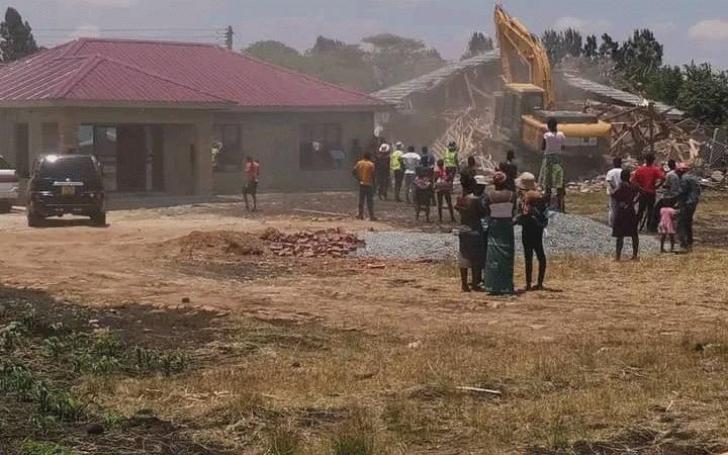News / Local
Harare begins mass demolition
01 Dec 2024 at 08:47hrs |
0 Views

The Harare City Council is set to launch a city-wide demolition campaign on Thursday, targeting structures built without approval on land designated for public amenities. The exercise, which will enforce 37 High Court orders, aims to dismantle over 5,000 illegal houses in various parts of the city.
Last week, the council began issuing 48-hour eviction notices to residents in affected areas. Among the first to receive these notices were 17 property owners in Mabelreign, with the demolitions expected to extend to high-density suburbs such as Budiriro, Kuwadzana, Glen View, and Mabvuku.
Acting Chief Development Control Officer James Mazvimba emphasized the need to restore urban order and address the ongoing problem of illegal land invasions.
"We have issued notices in Mabelreign and will extend the process to areas like Budiriro and Kuwadzana," said Mazvimba. "These land barons have invaded spaces meant for the housing waiting list and essential public amenities. We are acting within the provisions of the law, and enforcement begins on December 5 and 6."
Residents served with notices are expected to vacate the premises and restore the land to its original state. Non-compliance will result in council-led demolitions.
Mazvimba noted that many of the targeted structures are makeshift cabins hidden behind precast walls, which can be removed without court orders under the Urban Councils Act.
"We are not regularising any illegal settlements, especially on land earmarked for schools or public services. Court orders are already in place for certain areas, and the sheriff is assisting with their execution," he added.
He also cautioned residents against purchasing properties without proper documentation, stressing the importance of verifying permits and allocations from the council.
Government's Position
The Government has imposed a blanket ban on house demolitions, deeming such actions illegal. However, the Harare City Council argues that its actions are necessary to enforce urban planning regulations and prevent the misuse of public land.
Recently, over 30 houses were demolished in Belvedere as part of a broader operation targeting unauthorized developments. City officials stated that the land had been fraudulently allocated by a private company, despite warnings and a court order against further construction.
The demolitions have sparked public outrage, with affected residents accusing the council of inaction and exacerbating the housing crisis. The Ministry of Local Government and Public Works has distanced itself from the council's actions and ordered an investigation into the matter.
Controversy and Calls for Reform
The demolitions have reignited debates over urban housing and governance in Harare. Critics argue that delays in addressing illegal settlements have led to significant financial losses for residents. They also question the adequacy of council oversight in preventing unauthorized land allocations.
With thousands facing displacement, the demolitions highlight the urgent need for coordinated solutions to the city's growing housing crisis.
Last week, the council began issuing 48-hour eviction notices to residents in affected areas. Among the first to receive these notices were 17 property owners in Mabelreign, with the demolitions expected to extend to high-density suburbs such as Budiriro, Kuwadzana, Glen View, and Mabvuku.
Acting Chief Development Control Officer James Mazvimba emphasized the need to restore urban order and address the ongoing problem of illegal land invasions.
"We have issued notices in Mabelreign and will extend the process to areas like Budiriro and Kuwadzana," said Mazvimba. "These land barons have invaded spaces meant for the housing waiting list and essential public amenities. We are acting within the provisions of the law, and enforcement begins on December 5 and 6."
Residents served with notices are expected to vacate the premises and restore the land to its original state. Non-compliance will result in council-led demolitions.
Mazvimba noted that many of the targeted structures are makeshift cabins hidden behind precast walls, which can be removed without court orders under the Urban Councils Act.
"We are not regularising any illegal settlements, especially on land earmarked for schools or public services. Court orders are already in place for certain areas, and the sheriff is assisting with their execution," he added.
Government's Position
The Government has imposed a blanket ban on house demolitions, deeming such actions illegal. However, the Harare City Council argues that its actions are necessary to enforce urban planning regulations and prevent the misuse of public land.
Recently, over 30 houses were demolished in Belvedere as part of a broader operation targeting unauthorized developments. City officials stated that the land had been fraudulently allocated by a private company, despite warnings and a court order against further construction.
The demolitions have sparked public outrage, with affected residents accusing the council of inaction and exacerbating the housing crisis. The Ministry of Local Government and Public Works has distanced itself from the council's actions and ordered an investigation into the matter.
Controversy and Calls for Reform
The demolitions have reignited debates over urban housing and governance in Harare. Critics argue that delays in addressing illegal settlements have led to significant financial losses for residents. They also question the adequacy of council oversight in preventing unauthorized land allocations.
With thousands facing displacement, the demolitions highlight the urgent need for coordinated solutions to the city's growing housing crisis.
Source - The Sunday Mail
Join the discussion
Loading comments…


























